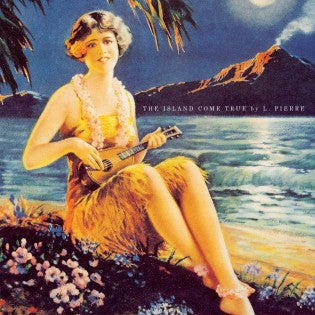Melodic Records
L. Pierre – The Island Come True
L. Pierre – The Island Come True
Couldn't load pickup availability
Across his many projects past and present, it’s under the moniker of L. Pierre that Aidan Moffat has perhaps best opened up the bare bones of his thirst for sonic exploration. The Island Come True is Moffat’s fourth album as L. Pierre and is a work assembled from the vast cavern of his assembled field recordings and samples, a collage that works as a sonic patchwork of the 39 year-old’s own mind. A popular lyrical raconteur whether as one half of Arab Strap, writing under his own name or when collaborating with Bill Wells – as on last year’s Scottish Album Of The Year award winner Everything’s Getting Older – it’s as this carnation where the true extent of his musical eclecticism is revealed.
As such, the album is as a dreamscape, with fragments of classical works, drum samples, instructional speeches and, in a link back to his last album, recordings of nature. Electronics elements previously employed on past albums have been discarded, the album in its entirety consisting only of these found sounds.
The record is overridden by the hissing of tape tracks and drones, and there’s good reason for that: “there’s something beautiful in hearing the grit and hiss of old recordings” professes the artist who admits that he’s even gone as far as adding and embellishing click tracks and surface noise.“Everything sounds so clean and clinical and perfect today, but I love hearing something that sounds worn and suggests the music has a history. It’s gorgeous and sad at once, as though it’s lived a life and survived to tell the tale.” Sadness is a word that could readily be used to describe big sections of Island Come True, a fine line trodden between soothing warmth and bleaker depths throughout.
Previous albums under the Pierre guise had a specific mood or ambience that they attempted to portray; 2002’s Hypnogogia, Moffat explains, was his own home-made comedown album, its 2005 follow-up Touchpool a warped take on lounge music, whilst third LP Dip represented something more physical, consisting largely of countryside recordings. With The Island Come True, though, the onus is on the listener’s own imagination and not his; “it’s about taking the listener on a wee journey, but where that journey goes is entirely up to them” says Moffat. “I wanted this one to be more suggestive and mysterious than the previous records.”
It’s apt that such an otherworldly LP has been named after the title of the chapter in Peter Pan where they discover Neverland. Pan celebrates the power of the human imagination and its Island Come True’s aim to do that too, the open-ended nature of the eleven sprawling constructions allowing listeners to take away their own interpretation of what exactly it is that the Scotsman is trying to evoke and achieve. Song titles, too, delve into the extraordinary, the surreal and, more often than not, the sinister; ‘KAB 1340’ is the name of the radio station being listened to in John Carpenter’s The Fog, ‘The Grief That Does Not Speak’ is taken from a speech in Macbeth, ‘Tulpa’ is a Buddhist term for a physical object brought about purely by the power of the mind.
Moffat admits that he thought he was done with L.Pierre after 2007’s Dip,confessing that his sense of happiness with that record made him feel like he didn’t need to revisit the project any further. It’s a relief that he gained an urge to reprise it late last year. For all the wonderful work that he’s put out in his various guises over the past 17 years, it is arguably as L.Pierre where he’s at his most beguiling and unexplained, collecting and sculpting these pieces of aural history together for reasons that he never quite tells us. Such is the beauty of the project and of The Island Come True – it is for us to draw our conclusions upon.


